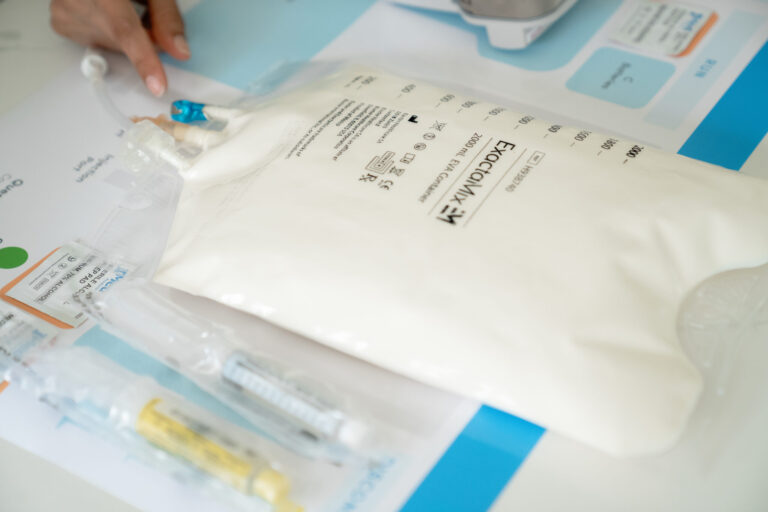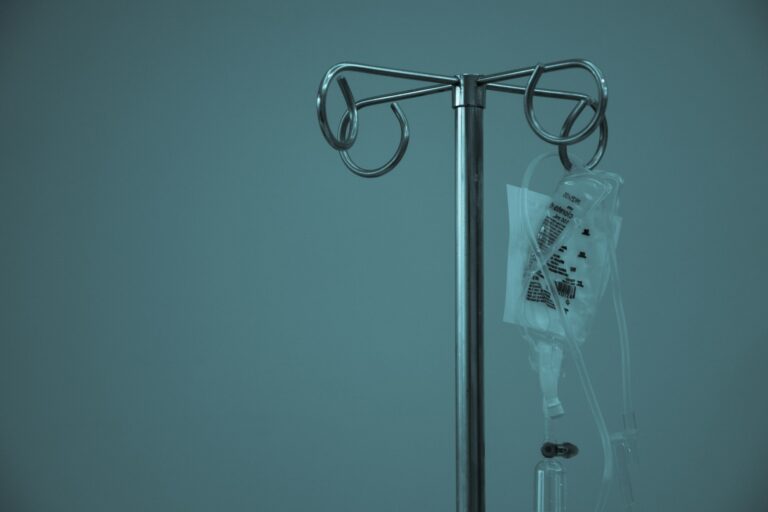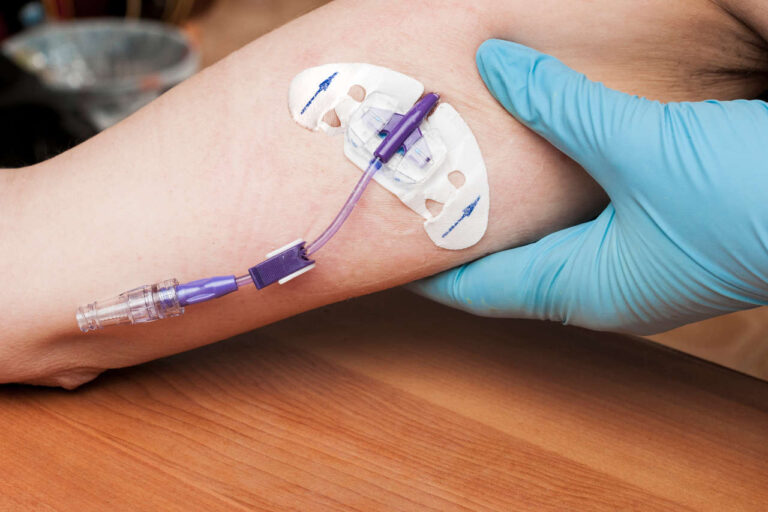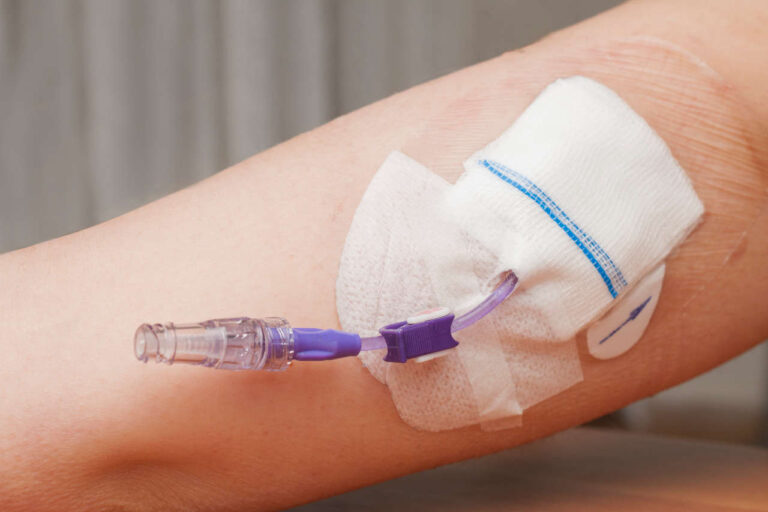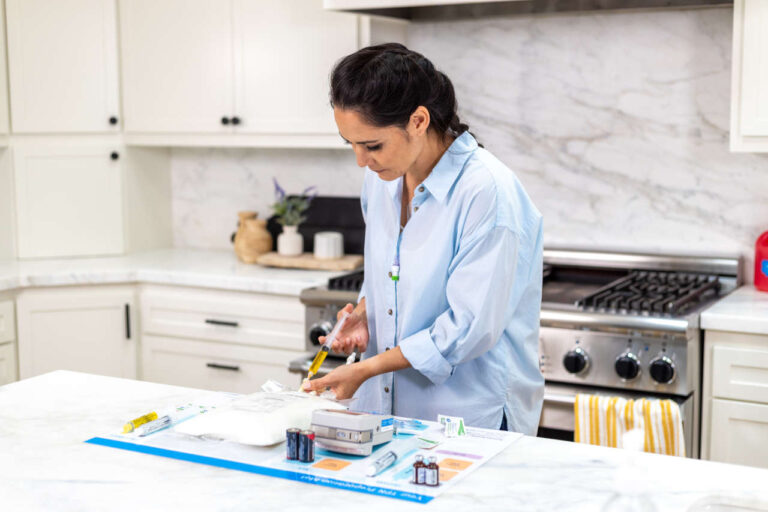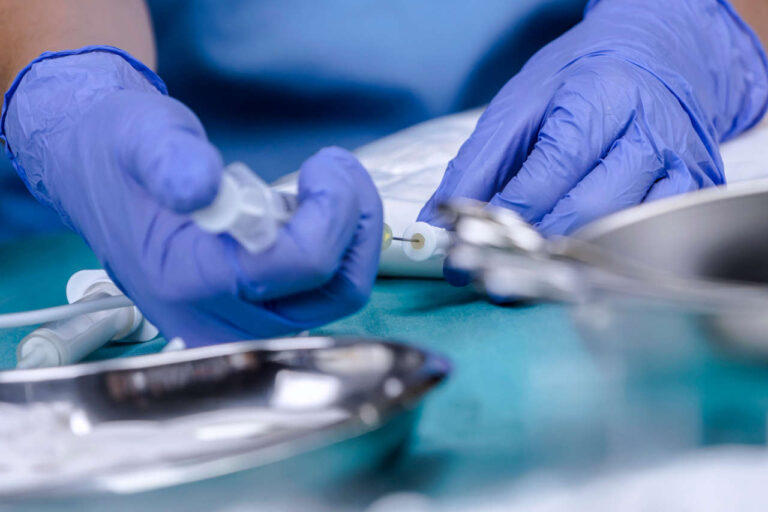
Mặc dù TPN có thể là phương pháp điều trị cứu sống những người không thể hấp thụ đủ dinh dưỡng thông qua các phương pháp thông thường, nhưng nó cũng có một số tác dụng phụ tiềm ẩn.
Dịch truyền tĩnh mạch có sẵn đầy đủ
Sẵn sàng liên tục, chăm sóc không bị gián đoạnMột số bệnh nhân dùng TPN bị tiêu chảy, điều này có thể gây lo ngại cho cả bệnh nhân và nhân viên y tế, vì có thể dẫn đến mất nước và mất cân bằng điện giải. Tuy nhiên, tiêu chảy cũng có thể là kết quả của các yếu tố khác.
Vậy, TPN có thể gây tiêu chảy không?
Đó là câu hỏi chúng ta sẽ trả lời ở đây khi xem xét kỹ hơn liệu pháp TPN và các tác dụng phụ tiềm ẩn của nó.
Hiểu về TPN
Dinh dưỡng qua đường tĩnh mạch hoàn toàn (TPN) là phương pháp nuôi dưỡng dành cho những người không thể dung nạp thức ăn qua đường tiêu hóa, chẳng hạn như:
- Những người bị viêm tụy mãn tính
- Cá nhân với rối loạn hấp thu
- Bệnh nhân ung thư đang điều trị hóa chất
- Bệnh nhân bị tắc nghẽn đường tiêu hóa hoặc rối loạn nhu động ruột
- Bệnh nhân mắc bệnh Crohn và các bệnh khác hội chứng viêm ruột
TPN cung cấp tất cả các chất dinh dưỡng cần thiết thông qua đường truyền tĩnh mạch vào máu. Nó hoàn toàn không cần qua hệ tiêu hóa. Có gì trong dung dịch TPN xác định nguy cơ tiêu chảy.
Chuyên gia dinh dưỡng sẽ kiểm tra độ tuổi, giới tính, cân nặng và tình trạng sức khỏe của một người để đề xuất hỗn hợp dinh dưỡng cụ thể đáp ứng nhu cầu của họ. Dung dịch thường chứa hỗn hợp cân bằng các chất dinh dưỡng đa lượng, axit béo thiết yếu, chất điện giải, vitamin và các nguyên tố vi lượng.
TPN có thể gây tiêu chảy như thế nào?
Làm thế nào TPN có thể gây ra tác dụng phụ này, trong khi một số nghiên cứu cho thấy rằng dinh dưỡng qua đường tiêm có thể giúp kiểm soát bệnh tiêu chảy mãn tính?
Tất cả đều phụ thuộc vào từng cá nhân, tình trạng sức khỏe của họ và hỗn hợp chất dinh dưỡng mà họ nhận được thông qua TPN.
Sau đây là một số cách mà TPN có thể gây tiêu chảy:
Glucose dư thừa
Dung dịch TPN chứa hàm lượng glucose cao. Glucose là nguồn năng lượng chính của cơ thể. Dung dịch TPN cung cấp glucose để đáp ứng nhu cầu năng lượng của cơ thể.
Nồng độ glucose cao trong cơ thể có thể dẫn đến tăng đường huyết, lượng đường dư thừa trong máu, có thể gây quá tải cho hệ tiêu hóa.
Khi cơ thể nhận được lượng glucose nhiều hơn mức có thể hấp thụ, lượng glucose dư thừa sẽ kéo nước vào ruột, dẫn đến phân lỏng và tiêu chảy.
Chất béo dư thừa
Lipid là một thành phần khác của dung dịch TPN có thể gây tiêu chảy. Dung dịch TPN thường có hàm lượng chất béo cao để cung cấp cho cơ thể axit béo thiết yếu và calo bổ sung.
Tuy nhiên, một số bệnh nhân có thể gặp khó khăn trong việc dung nạp lượng mỡ này. Họ có thể bị kém hấp thu, góp phần gây ra tình trạng tiêu chảy mỡ, một tình trạng đặc trưng bởi phân có mỡ, nhờn.
Lượng chất béo quá mức cũng có thể dẫn đến sản xuất axit béo chuỗi ngắn trong ruột. Các axit béo này có thể gây kích ứng và viêm niêm mạc ruột, dẫn đến tiêu chảy.
Dung dịch thẩm thấu cao
Một cách khác mà TPN có thể gây tiêu chảy là thông qua hiệu ứng thẩm thấu. Dung dịch TPN có nồng độ cao và có thể có tính thẩm thấu cao. Tính thẩm thấu cao này có nghĩa là chúng có nồng độ các chất như glucose và chất điện giải cao hơn so với dịch tự nhiên của cơ thể.
Tình trạng tăng thẩm thấu do TPN gây ra là nguyên nhân dẫn đến tiêu chảy. Nó có thể tạo ra hiệu ứng thẩm thấu, hút nước vào ruột, dẫn đến tăng nhu động ruột và tiêu chảy.
Cái này tiêu chảy thẩm thấu rõ rệt hơn ở những người có chức năng đường tiêu hóa bị suy giảm, chẳng hạn như những người mắc bệnh viêm ruột hoặc hội chứng ruột ngắn.
Những thay đổi trong quá trình hấp thụ dinh dưỡng
Những thay đổi trong quá trình hấp thụ chất dinh dưỡng là một trong số Biến chứng của TPN mà nhiều người có thể trải nghiệm.
Những thay đổi này xảy ra do việc đưa chất dinh dưỡng trực tiếp vào máu. Việc bỏ qua hệ tiêu hóa theo cách này có thể làm gián đoạn quá trình tiêu hóa và hấp thụ bình thường, khiến các chất dinh dưỡng chưa được tiêu hóa đi qua, dẫn đến kích ứng và viêm.
Tác dụng này của TPN có thể gây tiêu chảy bằng cách thay đổi cấu trúc và chức năng của ruột và gây ra tình trạng đi ngoài không đều.
Các vấn đề về ruột
TPN cũng có thể gây tiêu chảy bằng cách tạo ra các vấn đề về ruột.
Bệnh nhân dùng TPN dễ bị rối loạn đường ruột hơn, chẳng hạn như tình trạng vi khuẩn phát triển quá mức trong ruột non. Sự phát triển quá mức này có thể dẫn đến quá trình lên men quá mức, tạo ra khí và các sản phẩm phụ khác gây tiêu chảy.
Việc bỏ qua đường tiêu hóa và không sử dụng ruột khi dùng TPN cũng có thể dẫn đến teo ruột. Việc thiếu kích thích vật lý ở ruột non có thể làm giảm nhu động ruột.
Tất cả các vấn đề về đường ruột do TPN gây ra đều có thể dẫn đến tiêu chảy.
Sự mất cân bằng của hệ vi khuẩn đường ruột
Hệ vi khuẩn đường ruột là một cộng đồng đa dạng gồm các vi khuẩn có lợi, nấm men và các vi sinh vật khác giúp tiêu hóa và hấp thụ chất dinh dưỡng đúng cách.
TPN có thể phá vỡ sự cân bằng của hệ vi sinh vật đường ruột tự nhiên bằng cách bỏ qua con đường vận chuyển chất dinh dưỡng thông thường qua đường tiêu hóa. Kết quả là, đường ruột sẽ có nhiều vi sinh vật có hại hơn vi sinh vật có lợi.
Sự mất cân bằng gây ra bởi Liệu pháp TPN có thể dẫn đến thay đổi thói quen đại tiện và gây ra các triệu chứng về đường tiêu hóa như tiêu chảy.
Cho ăn quá nhiều
Ăn quá nhiều hoặc truyền nhanh TPN cũng có thể dẫn đến tiêu chảy do làm quá tải hệ tiêu hóa và gây ra các vấn đề về đường tiêu hóa.
Cho ăn quá nhiều nghĩa là cung cấp nhiều chất dinh dưỡng hơn mức cơ thể có thể xử lý. Nó có thể vượt quá khả năng hấp thụ của hệ tiêu hóa và dẫn đến tiêu chảy.
Truyền nhanh TPN cũng có thể vượt quá khả năng quản lý chất dinh dưỡng đưa vào của cơ thể, dẫn đến hiệu ứng thẩm thấu và gây tiêu chảy khi cơ thể cố gắng loại bỏ chất dinh dưỡng dư thừa.
Hỏi về máy truyền dịch tại nhà TPN
Nhiễm trùng
Một trong những Tác dụng phụ của TPN Nguyên nhân gây tiêu chảy là nhiễm trùng. Nhiễm trùng do TPN gây ra dẫn đến tiêu chảy khi hệ thống miễn dịch của cơ thể cố gắng đẩy lùi các tác nhân gây bệnh xâm nhập.
Sử dụng catheter tĩnh mạch trung tâm trong liệu pháp TPN có thể làm tăng nguy cơ nhiễm trùng, chẳng hạn như nhiễm trùng máu và nhiễm trùng huyết. Nguy cơ này tăng lên nếu vị trí đặt catheter TPN bị nhiễm trùng và người thực hiện không tuân thủ các quy trình vệ sinh tiêu chuẩn.
Nhiễm trùng như Clostridium difficile (C. diff) cũng phổ biến hơn ở những bệnh nhân TPN. Vi khuẩn này có thể dẫn đến tiêu chảy liên quan đến kháng sinh, trong khi nhiễm trùng có thể lan sang các bộ phận khác của cơ thể và gây ra nhiều biến chứng hơn.
Cách phòng ngừa tiêu chảy ở bệnh nhân TPN

Điều chỉnh cuộc sống của bạn với TPN Mặc dù tiêu chảy là một hiện tượng hiếm gặp ở những bệnh nhân đang dùng TPN, nhưng việc phải đối mặt với nó chỉ làm tăng thêm những thách thức cho phương pháp điều trị này.
Có một số chiến lược mà các nhà cung cấp dịch vụ chăm sóc sức khỏe và bệnh nhân có thể sử dụng để ngăn ngừa hoặc kiểm soát tiêu chảy khi dùng TPN. Hãy cùng xem xét một số chiến lược trong số đó.
Công thức TPN thích hợp
Công thức TPN phù hợp rất quan trọng trong việc ngăn ngừa tiêu chảy.
Công thức TPN phải được cân bằng với lượng carbohydrate, protein, chất béo, vitamin và khoáng chất phù hợp để đáp ứng nhu cầu của bệnh nhân mà không gây quá tải cho hệ tiêu hóa.
Đảm bảo dung dịch được pha trộn và khử trùng tốt cũng có thể làm giảm nguy cơ mắc bệnh tiêu chảy do TPN.
Giới thiệu dần dần
Bằng cách bổ sung TPN dần dần, bạn có thể tránh được tình trạng tiêu chảy. Cơ thể cần thời gian để thích nghi với việc hấp thụ dinh dưỡng qua đường máu, và việc nạp dinh dưỡng đột ngột có thể gây quá tải cho hệ tiêu hóa.
Bắt đầu chậm và tăng dần tốc độ truyền để hệ tiêu hóa của bệnh nhân có thể thích nghi với đường truyền.
Theo dõi khả năng dung nạp và cho ăn quá mức
Theo dõi khả năng dung nạp và tình trạng ăn quá nhiều là một khía cạnh quan trọng khác để ngăn ngừa tiêu chảy. Hãy theo dõi chặt chẽ người nhận để phát hiện các dấu hiệu sau:
- kém hấp thu
- Rối loạn tiêu hóa
- Thay đổi thói quen đại tiện
Việc đánh giá thường xuyên chức năng ruột và lượng phân thải ra có thể giúp phát hiện sớm các dấu hiệu không dung nạp hoặc ăn quá nhiều. Điều này cho phép bạn điều chỉnh công thức hoặc tốc độ truyền và ngăn ngừa tiêu chảy do liệu pháp TPN.
Kiểm soát nhiễm trùng
Thực hiện các biện pháp kiểm soát nhiễm trùng nghiêm ngặt như vệ sinh tay đúng cách, làm sạch và khử trùng thiết bị để ngăn ngừa nhiễm trùng máu liên quan đến đường truyền trung tâm.
Tuân thủ các kỹ thuật vô trùng trong quá trình sử dụng TPN, chăm sóc ống thông thường xuyên và xử lý kịp thời mọi dấu hiệu nhiễm trùng có thể giúp bạn tránh bị tiêu chảy khi điều trị bằng TPN.
Địa chỉ cân bằng chất lỏng
Những người dùng TPN có nguy cơ mất nước cao hơn do không được cung cấp đủ lượng vitamin qua đường uống.
Bạn phải đảm bảo đủ nước và kiểm soát cân bằng chất lỏng để ngăn ngừa mất nước, giảm nguy cơ tiêu chảy và duy trì tính toàn vẹn và chức năng của đường ruột.
Hãy cẩn thận với tình trạng mất cân bằng điện giải
Theo dõi chặt chẽ nồng độ điện giải của bệnh nhân cũng là một khía cạnh quan trọng khác để ngăn ngừa tiêu chảy ở bệnh nhân TPN.
Sự mất cân bằng các chất điện giải như kali, natri và magie có thể dẫn đến rối loạn tiêu hóa. Việc phát hiện những mất cân bằng này cho phép bạn điều chỉnh công thức và giảm thiểu nguy cơ tiêu chảy.
AmeriPharma Specialty Care
Dinh dưỡng qua đường tĩnh mạch toàn phần | Dẫn đầu trong hỗ trợ TPN
Thay đổi chế độ ăn uống và lối sống
Mặc dù dung dịch TPN cung cấp các chất dinh dưỡng thiết yếu, người nhận vẫn có thể bị khó chịu ở đường tiêu hóa nếu ăn uống.
Thay đổi chế độ ăn uống và lối sống, chẳng hạn như tập thể dục, có thể giúp kiểm soát chức năng đường tiêu hóa và giảm khả năng bị tiêu chảy.
Thuốc men
Nếu bạn vẫn bị tiêu chảy do liệu pháp TPN sau khi áp dụng các chiến lược này, bạn có thể chuyển sang dùng thuốc để điều trị.
Hãy tham khảo ý kiến bác sĩ để tìm ra loại thuốc hiệu quả nhất cho tình trạng bệnh của bạn và tuân thủ phác đồ điều trị để tránh các biến chứng tiếp theo.
Nhận liệu pháp TPN tại nhà với Nhà thuốc chuyên khoa AmeriPharma®
Bây giờ bạn đã biết rằng TPN có thể gây tiêu chảy, bạn có thể áp dụng các chiến lược của chúng tôi để tránh bệnh này và tham khảo ý kiến bác sĩ chăm sóc sức khỏe nếu bạn nhận thấy bất kỳ dấu hiệu bất thường nào.
Nếu bạn muốn được điều trị tại nhà bằng TPN với nguy cơ tiêu chảy thấp hơn, Nhà thuốc chuyên khoa AmeriPharma® có thể giúp.
Chúng tôi giao vật liệu truyền dịch tại nhà TPN đến tận nhà bạn trong bao bì kín đáo và giúp bạn khắc phục mọi sự cố. hiệu thuốc chuyên khoa Chúng tôi cũng có thể cử các y tá truyền dịch chuyên khoa đến tận nhà để thực hiện liệu trình điều trị. Bạn có thể đáp ứng nhu cầu dinh dưỡng của mình với dịch vụ điều phối toàn diện, hỗ trợ 24/7/365 và hỗ trợ đồng thanh toán.
Liên hệ với chúng tôi bây giờ có thể nói chuyện với chuyên viên hướng dẫn bệnh nhân và nhận dịch vụ chăm sóc đặc biệt tại nhà.

